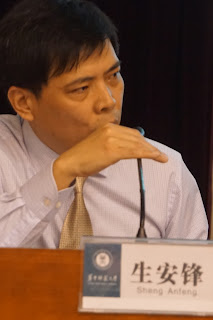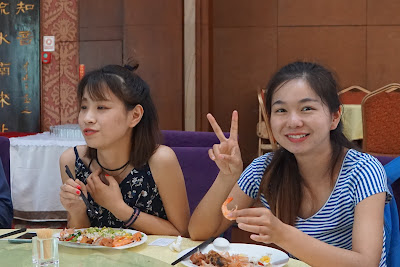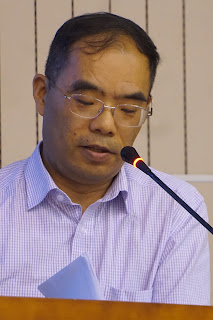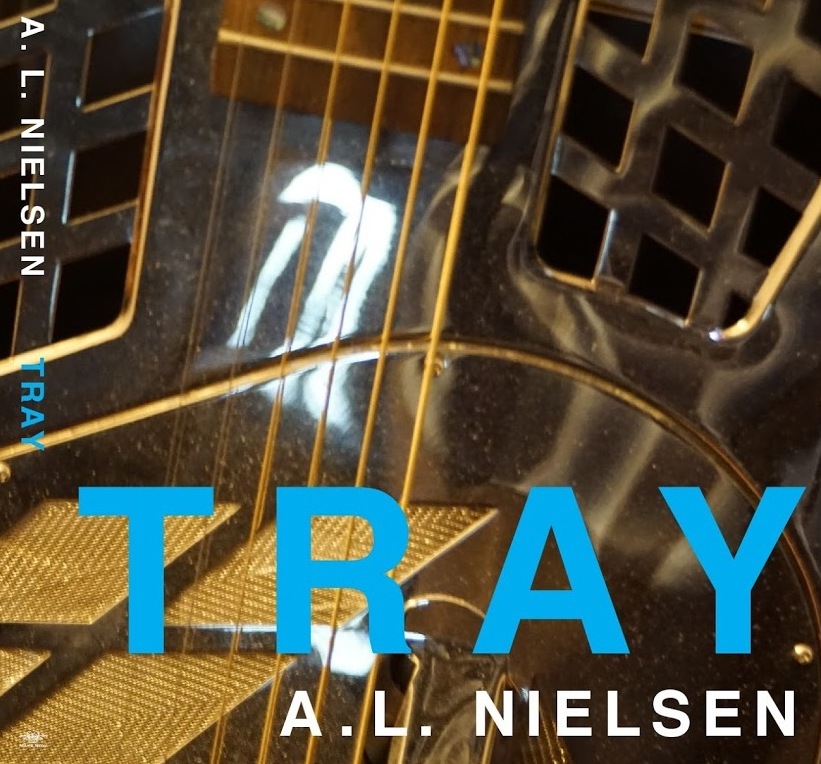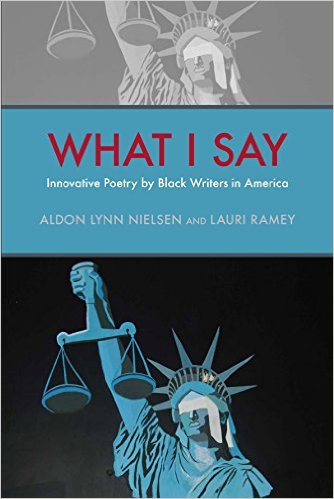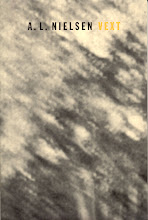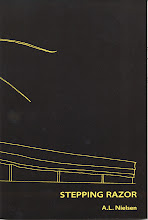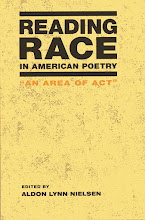[This vital communique from the imperishable Julie Patton]
IF & when does resetting the button lead to a novel "scene" heretofore unseen? Spay, neuter & spray attention to what's growing in the dark. before or after type hype. This is an appeal for help assessing a dash, an overlooked grind (gee-spot) in the creative corpus before folks slide off the record.
Parsing these headwinds by race, or rather grouping Matana Roberts, Fay Victor, Moor Mother and HAGL together as "The Emergence of A New Black Avant-Garde: Experimental Music and Text" leaves so much rich history & gold out in the cold. Is the wonderful Matana Roberts aware that she is "at the forefront" of "a major new phase of the movement now commonly known as experimentalism?" This titular headline feels as loaded as a washing machine in a Tide commercial. Text & music experimentation, black & white and read all over is as old as dirt.
How to position the deep sounds of Carole Ione & Pauline Oliveros in this context? What about Erica Hunt & Marty Ehrlich's on-going music & text collaborations, Tracie Morris & Vijay Iyer, Butch Morris's Poetry Choir, Patricia Spears Jones & Jason Hwang, the late Akilah Oliver plus Anne Waldman? 1960's & '70's music and poetry scenes opened to the betwixt of solidarity amid the messiness of life and (perceived) shifting cultural rhythms. Could it be that growing up within the shadows of Jim Crow, segregation, civil disobedience, multiple assassinations, fiery rebellions and televised war allowed for a different spirit of intellectual co-existence (between forms, genres, sentients) & amid the electrifying dissonance, of words, sound, worlds and war? The low down on this trail-blazing hyphen encouraged creatives to "take it to the bridge" to dance between a rock and a hard place & get real communicating with each other beyond the usual lines of power. This experimentalism has many roots and vectors. It didn't exist in a polarized north American context or sociopolitical vacuum. It opened to the international black diaspora, Latin America, Asia and every troubling elsewhere. Navel gazing was out, the world was in. The independence movements of African nations were on the minds of black folk cutting their own independence movement on American soil. So was AIM , Native American resistance, and myriad other struggles—sounding off. Jayne Cortez picked up a rock and kept on hurling it to inner and outer space. Fire spit from tender connections in a rage to connect the dots.
One can pick up many a space-time traveler in these sound dimensions. Calls to action working the body on behalf of many a silenced soul, nation or language...Reverberating like speech, and speech like music. Any movement purporting to be "new" & "avant-garde" and "emerging" and all that jazz, gots to reckon with the insightful creatives that are still here and smoking... Twerking beyond linguistic frontiers. Poets Without Borders. Instrumental pass ports... Music & language in transition, in translation, re al sonic energy movements from Morocco to California, homo sapiens to birds, transcending and reaffirming joy of making, creating, healing...
Latasha Diggs embodies this current. Her polyphonic sound/text bodies "overall desire to communicate with other tongues” works muscle, tongue and groove in waves that travel far beyond the grapholect of English. She black but as the old song goes, "got the whole world in her hands" and keeps turning it over in ways that suggest she was there when the tower of Babel imploded. Douglas Kearney & Edwin Torres proves you don't even need instruments to have a band. You just have to orchestrate a party in your own mouth and paper kingdom.
Poetry & sound, music and text, how do we count thy ways? Go back & collect the forgotten. Progress isn't automatic drive. Its a standard clutch that allows one to travel in all directions at once. Sarah Riggs & Omar Barrada's visionary Tamaas devotes time, attention, publishing resources and the kitchen sink to making sure writers can clutch each other across oceans of xenophobia—backwards & forward, side to side, up/down, east/west/north/south—in Arabic, English & French tongues. Riggs & Barrada, Etel Adnan, brilliant syllable splitting poet NourbeSe, insist, in Omar's words, on “defending the dead” and the silenced, "among the traumas of history and the silences of archives." Omar and Philip's investigations into Moroccan Gnawa music and its relationship to slavery will reach ears at the Poetry Project this coming autumn. Its just a matter of time before it becomes instrumental in making us burst into tears, view page after page as wailing walls and right the blood on our hands.
The work is deep deep deep as time's signature wounds. Its zounds & Zongs! (NourbeSe Philip), She Who Tries Her Tongues, Feel trios and Swarm of Bees belong to all who labor within the precarious, seeking out new modes of expression, blood red threads, or ancient glottal stops on the way to becoming more and more human... Kind while accentuating our relationship to the honking, beeping, blurting, gurgling,hissing, barking, yowling, cooing, buzzing web.
Marking the "new" in a cluster of attention getting superlatives (while ignoring some of the most intriguing and influential practitioners and aspects of th form) makes me wonder if Mr. Bradley attends this dance with the intention of turning a midnight pumpkin into a vehicle for success. Stage coach'd presumptions narrowing a complex ecosystem down to a few field mice doesn't serve the nature of this form (formless as it may be) as much as a few living cells. Is this address a puffball stitched together on behalf of a few Cinderella-like careers? If so, no harm done but a disclaimer might clarify why this mythopoetic field of inquiry, as diverse and complex as permaculture, with its entangled roots, divergent histories, Babel'n cultures is being threaded thru this particular lens.
Lynton Kwei Johnson, Sainkho Namtchyla, Cecilia Vicuñauñ, Jaap Blonk, Umberto Akbal, Kamau Braithwaite, Vicente Huidobr, George Mario Angel Quinteroer, Christian Ide HintzeIde Hinze, Anne Waldman, Kurt Lampkin, Bob Cobbing, Joy Harjo, Thulani Davis, Anne Greene & Fred Ho, Harryette Mullen, countless Jali poets & dying languages entangled in the music of time are comrades. Allen Ginsberg, the Beats & Bob Holman & Endangered Language Alliance & Fain/Kocic's Commons Choir re English...
Psst! When you don't understand a language— its all music. The sound made a beginning and no one gets the last word on this subject baking apples and oranges until Burnt Sugar.
Coming to T E R M S with this ancient future gestalt is a complex journey, ok troubadour...But uh-oh! watch out for the way in which repackaging & branding scenes impacts the edge of such... So we get salty see/hear remarks amid rising seas, temperatures, fugues & refuse drifting language thaw... What prosperos there or not...?
Overseas or abroad, poetry encapsulates spoken word& sound poetry. Capitalizing the latter leads to, well, capitalism and ignoring written contexts (literacy) so some of todays youth might have to ride a horse backward in order to get back to tell I am bit from tail. Or call it a rap, a trap, a... ..
As for those mining this turf for decades solidarity in global glossolalia often trump'd local for support unless harking back to the Black Arts Movement & finding the Amiri in Akilah (Oliver). And for the truly flailing, out on a limb, what thrived in the wild might die if tamed in audiential zoos. So what's new about this particle might just be the grouping (for what's usually regarded as individual threads connected to a timeless project) color spectral. Don't get my inquiry wrong. I'm piqued that this hermeneutics is out there straining... Striped text & language projects can use some fleshing out. A murder of poets, a pack of musicians, come on, crow, crow louder.
Homering into once b&w territory with Orphic eye for this orphaned plane (in between, mixed, hybrid or mongrel tone) and who, what else might be left out of sight, suggests being on guard in advance of the titular party crashing until gotten w/rite. Might this be bard evidence change is in the wind Dylan takes the prize a new sign?) of what has no end or beginning being mark't with a B + E for entertainment ( & Hannah Arendt enters the fray: warning: warming trends) This experiment in living goes back & forth at the same time.
Aldon Lynn Nielsen shed new light on the musical roots of Lorenzo Thomas's poetry at Naropa this past June. It takes real sleuthing to locate such early recordings while drag'n in Chuck Berry and the Beach Boys.
Umbra, L=A=N=G=U=A=G=E poetics, the Vienna School, Futurist/Dadaists, international sound poetry movement, ethnopoetics, Black Aes Movement shed light on how/why we can git or got to (Ong, Ong agonomics). I guess Gil Scott Heron will always be outdistancing the new when it comes to who knews what.
Duriel Estelle Harris & Tyehimba Jess, can I get an amen cornering where text & music meets in your work?
This work has been ongoing in erstwhile language based vents where S P A C E is truly the place for parsing such... from the Poetry Project (where Cecil Taylor wd air on the word side & clear the room), to Naropa, ye olde Zinc bar, Segue, and other alphabet blocks which scored vocal graffiti into concrete sounds music venues wouldn't dare touch (with the exception of Roulette and an occasional opening at The Stone). Bradley's piece confirm suspicions that changes in the air might becoming thru musicians & music venues paying more attention to or hearing what it can no longer ignore:earth wind and fiery words (the people have spoken!). A sea change in what being human means demanding new ears.
I know I am missing some bodies but am happy to recall the uncategorizable Alva Rodgers and the bluesy Karma Mayet who have always taken their turn and time tabling in the mix with musicians.
Sadiq Bey has been grinding sonic pencils for decades. Weather in Detroit, NYC or Berlin, with his own percussion skills or touring with Don Byron or Uri Caine. Novel or marginalized things are less herd. And they often occur far far from prying ears. You can't really catch the most evanescent on recordings unless video is used because poets may imply strategies that involve doubling their mouth for a third ear. Plus live is where the gap alleged to be in between music and language; and the SPIRIT of fast unruly letters can best be felt & witnessed because when it comes to this kind of poetics gesture & signing are part of the groove. Sound recordings often flatten material out, err on one side or the utter.
I don't know many creatives that ever quit mess'n around—"experimenting"—in the dark. What archives track this train of thought? Regional biases (NYC & Bay braying) don't help. Detroit based Faruq Z. Bey, sax in or out of his mouth, explored this intermix right up until his death. Ione. Ione. Ione puts healing sounds on another level even with her beloved Pauline Oliveros in another space. Transcendent! Giovanni Singleton & Alice Coltrane go together. Singleton plugs meditative pauses in deliveries that rock between a southern preacher and heart sutras that make you see what you hear. Her calligrams are scores.
Russel Atkins pro seeds Amiri Baraka by a decade. He, by his own admission, had little if anything to do with "jazz" (except for lend'n Albert Ayler an ear regarding a "Summertime" arrangement he was deranging). Jeanne Lee regarded herself as a poet and read fairly often at Nuyorican. Jayne Cortez & the Firespitters ws forever new therefore ancient future as Baraka.
Will Alexander, Fred Moton, Nathaniel Mackey's text machines read as music—as in what's the diff when words are notes? Its all performance & mouth instruments. And in the tradition. Avant Garde is the tradition for holler'n black outside the margins. Ream'n time. pArt of a continuum, an on-going conversation.
Geoffrey Jacques, Shirley Leflor, Kim Hunter & others probably have more insight into these ritual vectors. Greg Tate, Carl Hancock Rux also.
Improvising poet/photographer Wayne Providence (alone or with Billy Bang and Hammet Bluitt) was magically alive live and has yet to emerge since he's deceased and edgy performers are seldom documented. I am sure the Koto inspired poet Kurt Lampkin has been up to some sound poetry since I last saw him a couple decades ago; but I know he's still represent'n...
Going back and back and back unless slave to marketing strategies coin'n movements at their risk, and holding generations of word workers hostage to commodifying intentions. Where does it stop. , heir on the side of Ntozake, Sekou Sundial, call Lee Ann Brown black and me white (because Lord knows I can't be found in any books purporting to be about—poetry & music or performance & jazz & improvisation and ecopoetics on the black side. Point is, if you can miss me over multiple decades then you can miss a lot (ditto for anything else purporting to start with the word vision) & I think I can throwdown fairly well. Not dead. Yet.
Far from new but blew in all directions. New/emergent/avante advance & experimentalism are catchy phrases people respond to, but old hats on the low down wilding edge fertility, disregard for positivist time lines & the ruins of throw-away culture, lifting particular threads from weft and warp might be more useful for trending, reFashioning good deeds & individualism, career marketing strategies & the like, but it seldom sets the record straight or serves the culture, da peeps in general. And that is one reason why, during the Black Arts Movement & before, events began or ended with the Roll Call of Bones & humble acknowledgements. Those singled out can help clarify things (so subsequent generations don't have to play catch-up and go dig'n up the Atkinses of the world out from under a rock). By the way, check out David Henderson, former Doo Wop crooner, at Motown USA along with spoken word artist MLK. The music in his voice, experimental bones. A lovely field of inquiry all around.
Speaking of this article, Cisco Bradley does a wonderful job pointing out female workers in the in-between of texts & music. Some archeologists have gone on to suggest that language is female and not just because its learned at the breast or in relation to "mother tongue"... Yet I can't help but wonder if the writer noticed the substantial contributions of imaginative writer, powerhouse vocalist, composer, instrumentalist Janice Lowe and the other women holding down that band in the spirit of community despite challenges that often come with the territory of juggling apples and oranges. Which reminds me: wanna be dead last?
Try sounding off on the Lower East Side as a skilled, talented, female instrumentalist (I include voice work here) and get'n work (ok, Penny Arcade?). Any work. Period. Now try as a black woman. And wonder over years & years. If its experimental music and poetry, ya pretty had to start your own project, go thru men, white spouses & curators, dominate an instrument males usually play, be attractive, pay a publicist, or go abroad. Black women working this crack had to get back—behind ever other identity, including Martians unless Venusian in bed— lol—so I can't help but wonder who are missing and how are things catalogues. Lousy, as far as I can tell. Lame as hell because push-button ain't the same as being curious and stretching out of ring worm. There. I said it. Yeah man, yeah MAN, yeah, music is cool, often too cool—to women who had to "get thee behind!" for the most part. But I hear this is changing, changing, changing still...Women are pretty...
INVISIBLE. Darker sisters laboring under musical/text notes found some refuge within the poetry world. A somewhat easier door to kick. But nevertheless, one of the most radical things one can do under the circumstances, is to love black women... Carrying on in this world...as the marriage between heaven and hell proposes: "Without Contraries is no progression. Attraction and Repulsion,
Reason and Energy, Love and Hate are necessary to Human existence. (Blake).
My primary concern is not with the article itself. I am just too plain cynical to be satisfied by good intentions alone. I want more. Its not sufficient when community is under threat and oceans rising with the bones of the past. I may be wrong but I think I've lived long enough to tire of filters. "New" has added weight in a consumer culture where people need to be handed back their own hands... It also separates out what in reality is often a much more wholistic gathering, collective inquiry & cultural project of resistance. Riding on each other's coat tails, felt pelt. The rest of the sentient world in this the 6th extinction are truly avant grade for going where humanity has yet to go! My apologies for squawking while they are silenced forever. Whose voice did we miss today. Sparrow me more emergence seas please. And before I close this passage and shut my Facebook mouth, I'm gonna give a shoutout to fellow Pisces, Abiodun Oyewole & the Last Poets, sound-text explorer Martha C. Mims, Jushi, Safiya Henderson Holmes, and all the foot-soldiers of mice and mend.

























































